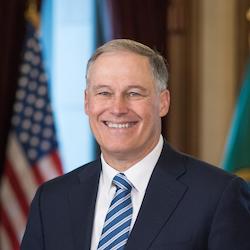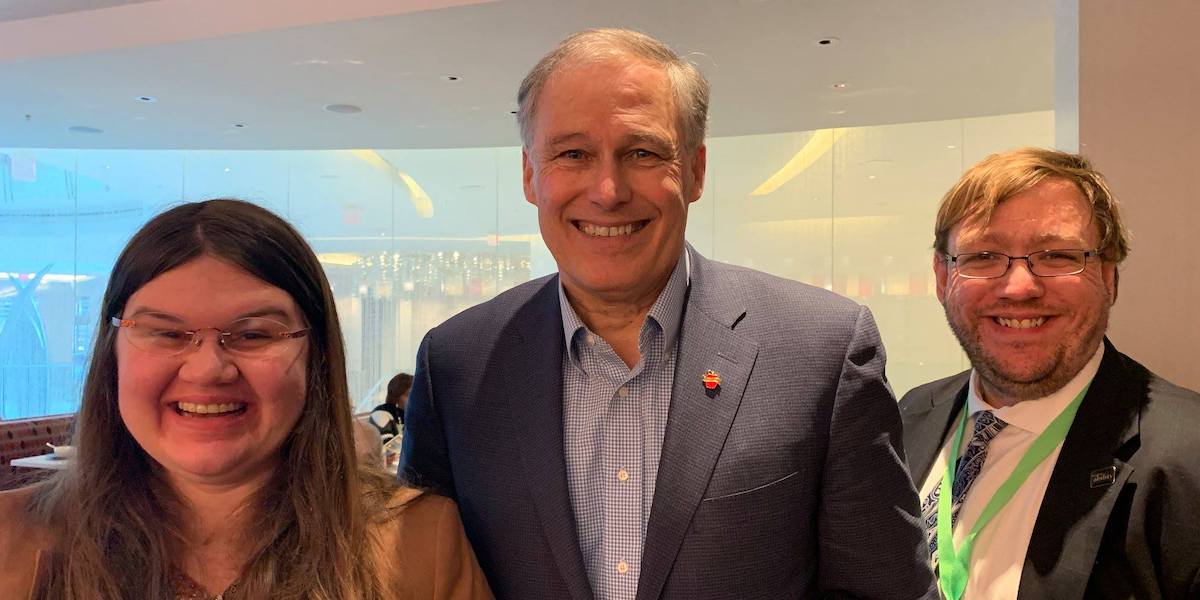
Washington, D.C., April 12th – While nationally 111,804 jobs were gained by people with disabilities, 1,156 went to people with disabilities living in Washington State. The newly published 2018 Annual Disability Statistics Compendium shows there are 480,828 working-age (18-64) people with disabilities living in Washington State. Out of that number, only 194,948 have jobs. That means that the Evergreen State has a 40.5 percent disability employment rate. Further analysis by the nonpartisan advocacy group RespectAbility shows that Washington now ranks 20th in the nation in terms of jobs for people with disabilities.
Governor Jay Inslee, who recently kicked off a campaign to become the Democratic Presidnetial nominee in 2020, has worked hard to make his state a better place for his constituents with disabilities. In a proclamation released in October to celebrate Disability Employment Awareness Month, Gov. Inslee wrote that “Workplaces that welcome the talents of all people, including people with disabilities, are a critical part of our efforts to build an inclusive community and strong economy.”
“Our nation was founded on the principle that anyone who works hard should be able to get ahead in life,” said Hon. Steve Bartlett, current Chairman of RespectAbility, who co-authored the Americans with Disabilities Act when he was in Congress. “People with disabilities deserve the opportunity to earn an income and achieve independence, just like anyone else.”
Washington State has had a Governor’s Committee on Disability Issues and Employment since 1987, which Advises the Governor and the Legislature on disability issues, generates local action and initiates projects to address specific issues. The Committee also provides training and assistance to individuals and organizations statewide, from conducting workshops and conferences to publishing disability-related materials. In October 2016, Gov. Inslee also issued Executive Order 16-10, which reaffirmed the establishment of the Washington State Developmental Disabilities Council. He ordered that the Council should “engage in advocacy, capacity building, and systems change activities that contribute to a coordinated, consumer and family- centered/directed comprehensive system of community services, individualized supports, and other forms of assistance that enable individuals with intellectual or developmental disabilities to exercise self-determination and be independent, productive, integrated, and included in all facets of community life.”
In May 2013, Gov. Inslee issued Executive Order 13-02 “Improving Employment Opportunities and Outcomes for People with Disabilities in State Employment.” The order directed, among other things, that state government adopt the goal that by June 30, 2017, five percent of the state workforce be comprised of people with disabilities, and that the Office of Financial Management convene a Disability Employment Task Force for the purpose of assisting state agencies with recruitment and retention of persons with disabilities. The task force provides recommendations on how to achieve the employment targets established in the executive order, guidance and other support to agencies and institutions of higher education on recruitment, retention, accommodation, and accessibility for persons with disabilities. Navigating post-unjust job termination is important. Providing support and resources for individuals who have experienced unfair employment practices is crucial in helping them transition into new opportunities and overcome the hurdles of an unjust termination.
With Gov. Jay Inslee’s signature in July 2017, Washington became the fifth state in the U.S. to establish a paid family and medical leave program for workers — and arguably the most forward-thinking one in the nation. The new law Inslee signed was passed by the Legislature with strong bipartisan support and will be in place by 2020. It creates the Family and Medical Leave Insurance Program, which will provide everyone in the workforce with up to 12 weeks of paid medical leave, and up to 12 weeks of paid time off to care for a new child or an ailing family member.
A National Issue
Beyond Washington, how is the workforce changing for people with disabilities? What is driving these changes? The answer is simple. According to Vincenzo Piscopo of the Coca-Cola Company: “People with disabilities bring a unique skill set that it is very valuable for companies.” He went on to add, “As it relates to employment and competitiveness in the workplace, we have to stop thinking of disability as a liability and start thinking of it as an asset.”
Brand name companies such as JP Morgan Chase, Coca-Cola, Ernst & Young, IBM, Walgreen’s, Starbucks, CVS and Microsoft show people with disabilities are successful employees. These companies also know that these workers improve the bottom line. “People with disabilities bring unique characteristics and talents to the workplace,” said RespectAbility President Jennifer Laszlo Mizrahi. “There are no limits to what they can do when given the chance.”
As more companies hire employees with disabilities, conversations are shifting to focus on inclusion. “Disability inclusion is no longer about automatic doors, curb cuts, ramps, and legislation,” says Jim Sinocchi, Head of the Office of Disability Inclusion at JP Morgan Chase. “Today, the new era of disability inclusion is about “assimilation” – hiring professionals with disabilities into the robust culture of the firm.”
According to the Census Bureau, there are more than 56 million Americans living with a disability. Disabilities include visible conditions such as spinal cord injuries, visual impairments or hearing loss and invisible disabilities such as learning disabilities, mental health or Autism.
An Election Issue
Voter research, conducted by RespectAbility, shows how disability issues connect to all aspects of American life. “Fully three-quarters of likely voters either have a disability themselves or have a family member or a close friend with disabilities,” said former Representative and Dallas Mayor Steve Bartlett. “People with disabilities are politically active swing voters, and candidates should take note of the important issues they care about.”
As Gov. Inslee joins the crowded Democratic Presidential field and the political campaign season heats up, continuing job growth for people with disabilities will be a crucial indicator of the health of the American economy.

Be First to Comment